Entrepreneurial Development: Applying Covey's 7 Habits for Success
VerifiedAdded on 2020/04/15
|11
|3163
|110
Report
AI Summary
This report delves into the principles of entrepreneurial development, focusing on the application of Stephen Covey's "7 Habits of Highly Effective People" to enhance personal and professional success within the information technology sector. The analysis begins with an examination of habit formation, personality, and character, differentiating between reactive and proactive behaviors. The core of the report involves a detailed exploration of each of Covey's habits, including "Be Proactive," "Begin with the End in Mind," "Put First Things First," "Think Win-Win," "Seek First to Understand, Then to Be Understood," "Synergize," and "Sharpen the Saw." Each habit is evaluated for its impact on entrepreneurial skills, with real-life examples demonstrating their practical application. The report also includes an analysis of P/PC balance, circle of influence, and emotional bank accounts. Development actions are outlined for each habit, providing a roadmap for personal improvement. The report concludes by emphasizing the importance of self-renewal and the integration of these habits to foster effectiveness in both personal and professional life.
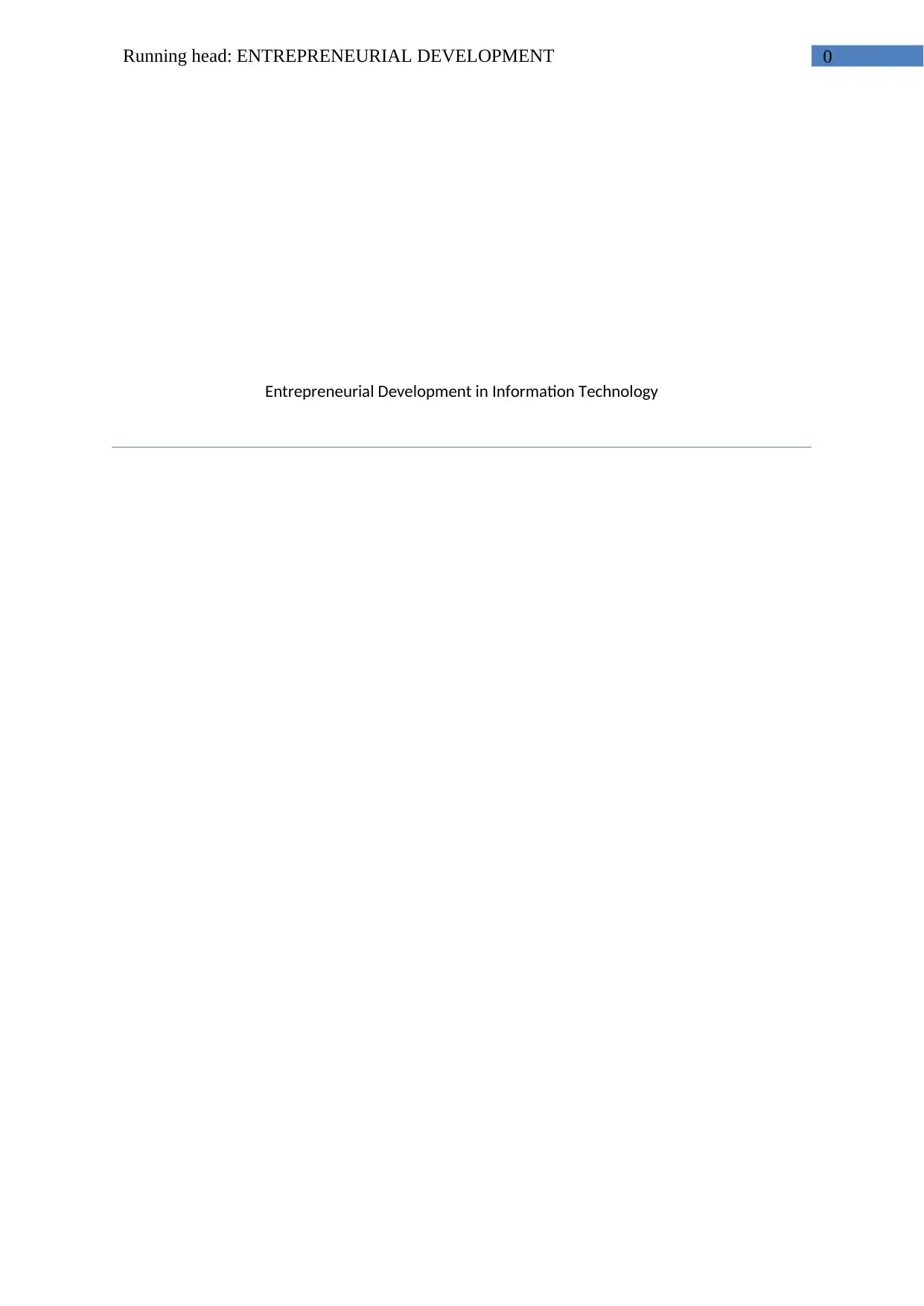
0Running head: ENTREPRENEURIAL DEVELOPMENT
Entrepreneurial Development in Information Technology
Entrepreneurial Development in Information Technology
Paraphrase This Document
Need a fresh take? Get an instant paraphrase of this document with our AI Paraphraser
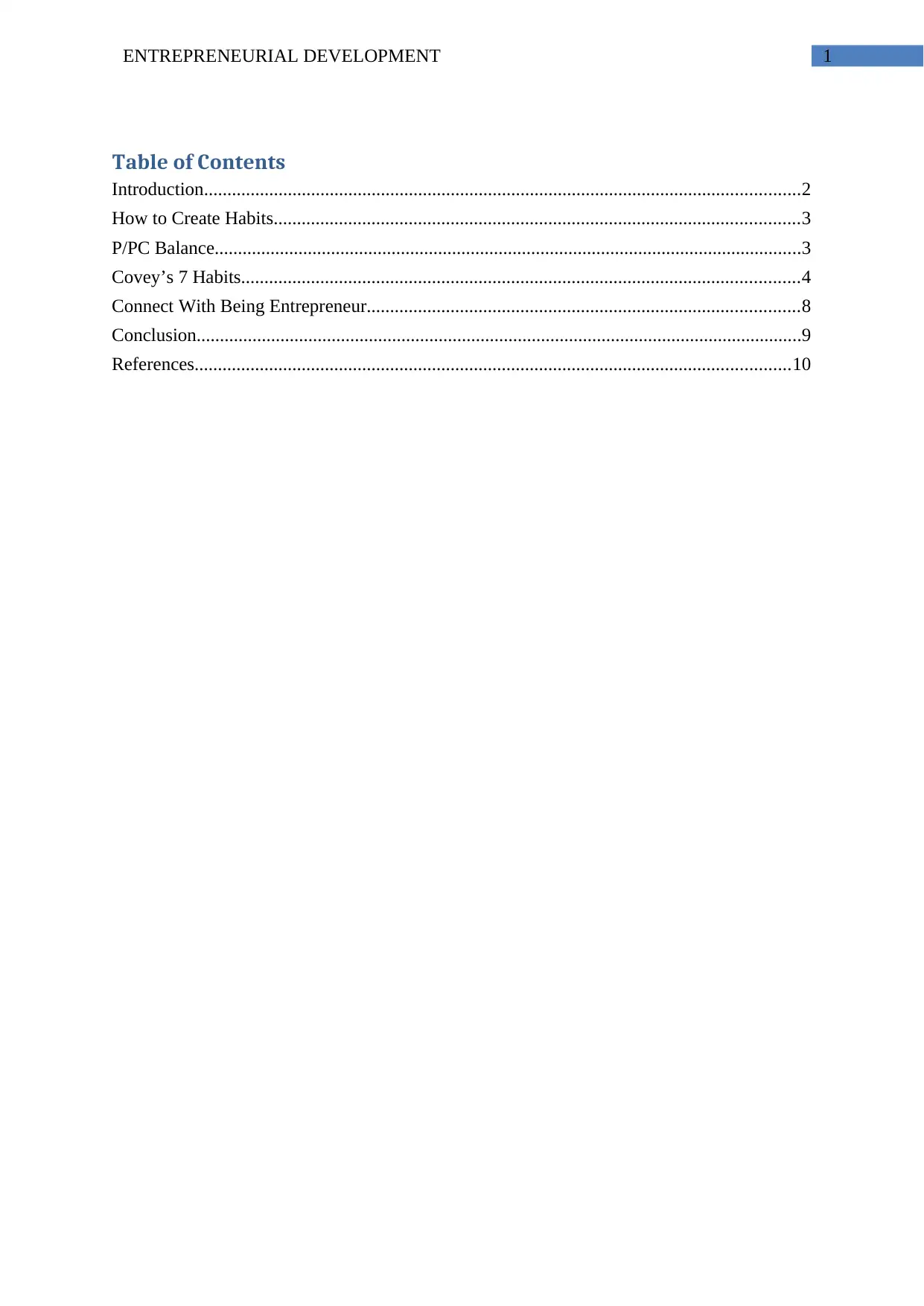
1ENTREPRENEURIAL DEVELOPMENT
Table of Contents
Introduction................................................................................................................................2
How to Create Habits.................................................................................................................3
P/PC Balance..............................................................................................................................3
Covey’s 7 Habits........................................................................................................................4
Connect With Being Entrepreneur.............................................................................................8
Conclusion..................................................................................................................................9
References................................................................................................................................10
Table of Contents
Introduction................................................................................................................................2
How to Create Habits.................................................................................................................3
P/PC Balance..............................................................................................................................3
Covey’s 7 Habits........................................................................................................................4
Connect With Being Entrepreneur.............................................................................................8
Conclusion..................................................................................................................................9
References................................................................................................................................10
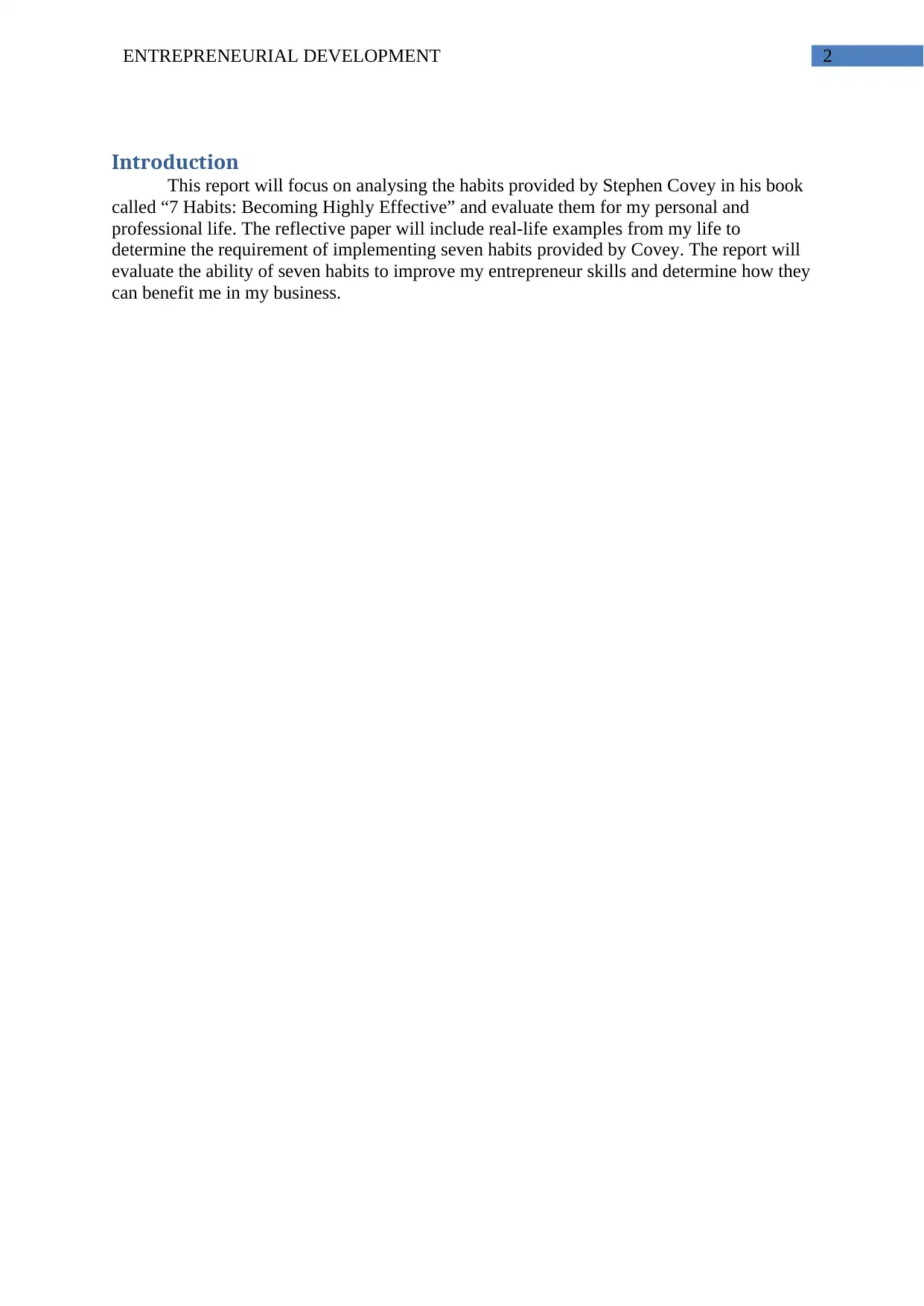
2ENTREPRENEURIAL DEVELOPMENT
Introduction
This report will focus on analysing the habits provided by Stephen Covey in his book
called “7 Habits: Becoming Highly Effective” and evaluate them for my personal and
professional life. The reflective paper will include real-life examples from my life to
determine the requirement of implementing seven habits provided by Covey. The report will
evaluate the ability of seven habits to improve my entrepreneur skills and determine how they
can benefit me in my business.
Introduction
This report will focus on analysing the habits provided by Stephen Covey in his book
called “7 Habits: Becoming Highly Effective” and evaluate them for my personal and
professional life. The reflective paper will include real-life examples from my life to
determine the requirement of implementing seven habits provided by Covey. The report will
evaluate the ability of seven habits to improve my entrepreneur skills and determine how they
can benefit me in my business.
⊘ This is a preview!⊘
Do you want full access?
Subscribe today to unlock all pages.

Trusted by 1+ million students worldwide
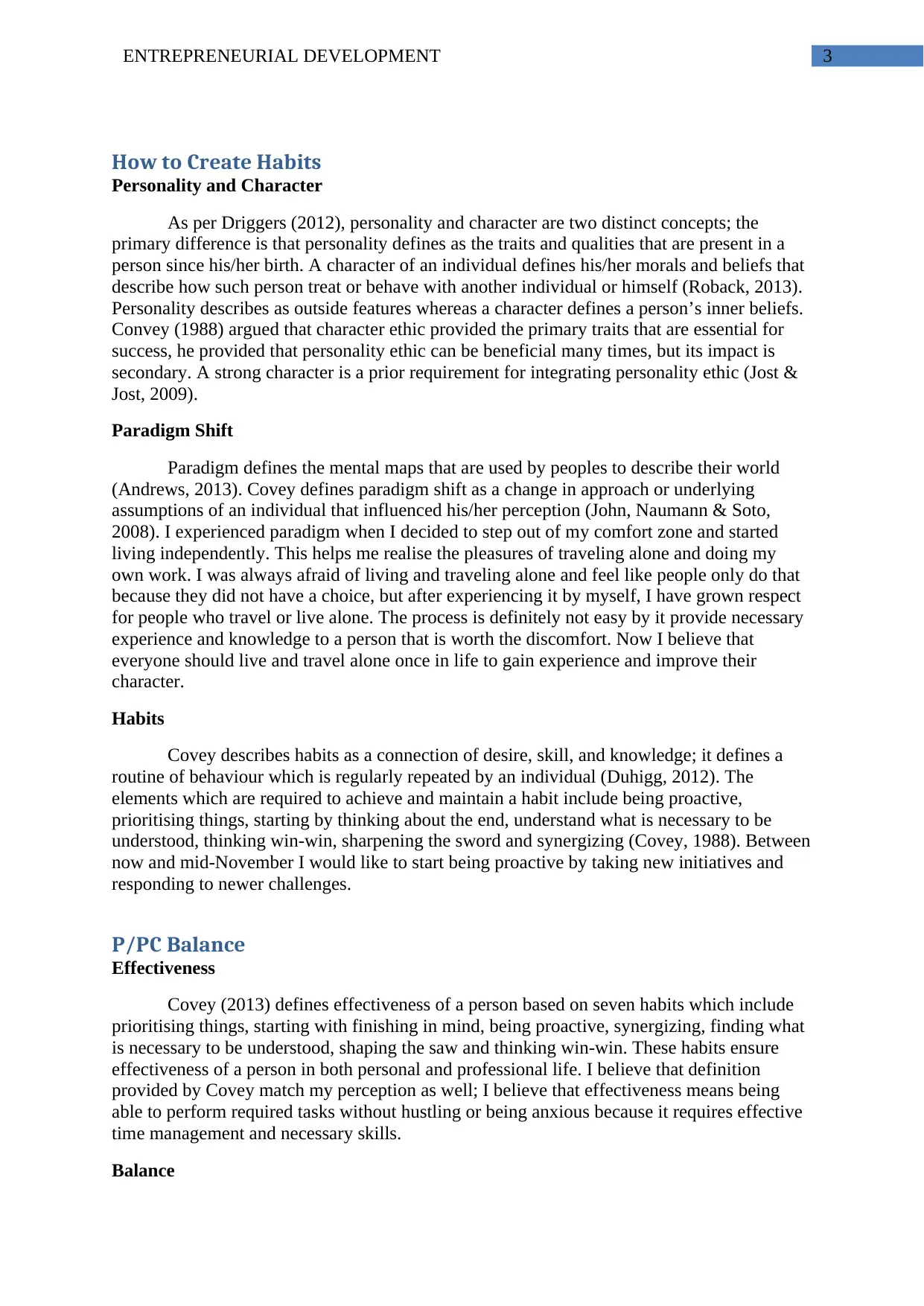
3ENTREPRENEURIAL DEVELOPMENT
How to Create Habits
Personality and Character
As per Driggers (2012), personality and character are two distinct concepts; the
primary difference is that personality defines as the traits and qualities that are present in a
person since his/her birth. A character of an individual defines his/her morals and beliefs that
describe how such person treat or behave with another individual or himself (Roback, 2013).
Personality describes as outside features whereas a character defines a person’s inner beliefs.
Convey (1988) argued that character ethic provided the primary traits that are essential for
success, he provided that personality ethic can be beneficial many times, but its impact is
secondary. A strong character is a prior requirement for integrating personality ethic (Jost &
Jost, 2009).
Paradigm Shift
Paradigm defines the mental maps that are used by peoples to describe their world
(Andrews, 2013). Covey defines paradigm shift as a change in approach or underlying
assumptions of an individual that influenced his/her perception (John, Naumann & Soto,
2008). I experienced paradigm when I decided to step out of my comfort zone and started
living independently. This helps me realise the pleasures of traveling alone and doing my
own work. I was always afraid of living and traveling alone and feel like people only do that
because they did not have a choice, but after experiencing it by myself, I have grown respect
for people who travel or live alone. The process is definitely not easy by it provide necessary
experience and knowledge to a person that is worth the discomfort. Now I believe that
everyone should live and travel alone once in life to gain experience and improve their
character.
Habits
Covey describes habits as a connection of desire, skill, and knowledge; it defines a
routine of behaviour which is regularly repeated by an individual (Duhigg, 2012). The
elements which are required to achieve and maintain a habit include being proactive,
prioritising things, starting by thinking about the end, understand what is necessary to be
understood, thinking win-win, sharpening the sword and synergizing (Covey, 1988). Between
now and mid-November I would like to start being proactive by taking new initiatives and
responding to newer challenges.
P/PC Balance
Effectiveness
Covey (2013) defines effectiveness of a person based on seven habits which include
prioritising things, starting with finishing in mind, being proactive, synergizing, finding what
is necessary to be understood, shaping the saw and thinking win-win. These habits ensure
effectiveness of a person in both personal and professional life. I believe that definition
provided by Covey match my perception as well; I believe that effectiveness means being
able to perform required tasks without hustling or being anxious because it requires effective
time management and necessary skills.
Balance
How to Create Habits
Personality and Character
As per Driggers (2012), personality and character are two distinct concepts; the
primary difference is that personality defines as the traits and qualities that are present in a
person since his/her birth. A character of an individual defines his/her morals and beliefs that
describe how such person treat or behave with another individual or himself (Roback, 2013).
Personality describes as outside features whereas a character defines a person’s inner beliefs.
Convey (1988) argued that character ethic provided the primary traits that are essential for
success, he provided that personality ethic can be beneficial many times, but its impact is
secondary. A strong character is a prior requirement for integrating personality ethic (Jost &
Jost, 2009).
Paradigm Shift
Paradigm defines the mental maps that are used by peoples to describe their world
(Andrews, 2013). Covey defines paradigm shift as a change in approach or underlying
assumptions of an individual that influenced his/her perception (John, Naumann & Soto,
2008). I experienced paradigm when I decided to step out of my comfort zone and started
living independently. This helps me realise the pleasures of traveling alone and doing my
own work. I was always afraid of living and traveling alone and feel like people only do that
because they did not have a choice, but after experiencing it by myself, I have grown respect
for people who travel or live alone. The process is definitely not easy by it provide necessary
experience and knowledge to a person that is worth the discomfort. Now I believe that
everyone should live and travel alone once in life to gain experience and improve their
character.
Habits
Covey describes habits as a connection of desire, skill, and knowledge; it defines a
routine of behaviour which is regularly repeated by an individual (Duhigg, 2012). The
elements which are required to achieve and maintain a habit include being proactive,
prioritising things, starting by thinking about the end, understand what is necessary to be
understood, thinking win-win, sharpening the sword and synergizing (Covey, 1988). Between
now and mid-November I would like to start being proactive by taking new initiatives and
responding to newer challenges.
P/PC Balance
Effectiveness
Covey (2013) defines effectiveness of a person based on seven habits which include
prioritising things, starting with finishing in mind, being proactive, synergizing, finding what
is necessary to be understood, shaping the saw and thinking win-win. These habits ensure
effectiveness of a person in both personal and professional life. I believe that definition
provided by Covey match my perception as well; I believe that effectiveness means being
able to perform required tasks without hustling or being anxious because it requires effective
time management and necessary skills.
Balance
Paraphrase This Document
Need a fresh take? Get an instant paraphrase of this document with our AI Paraphraser
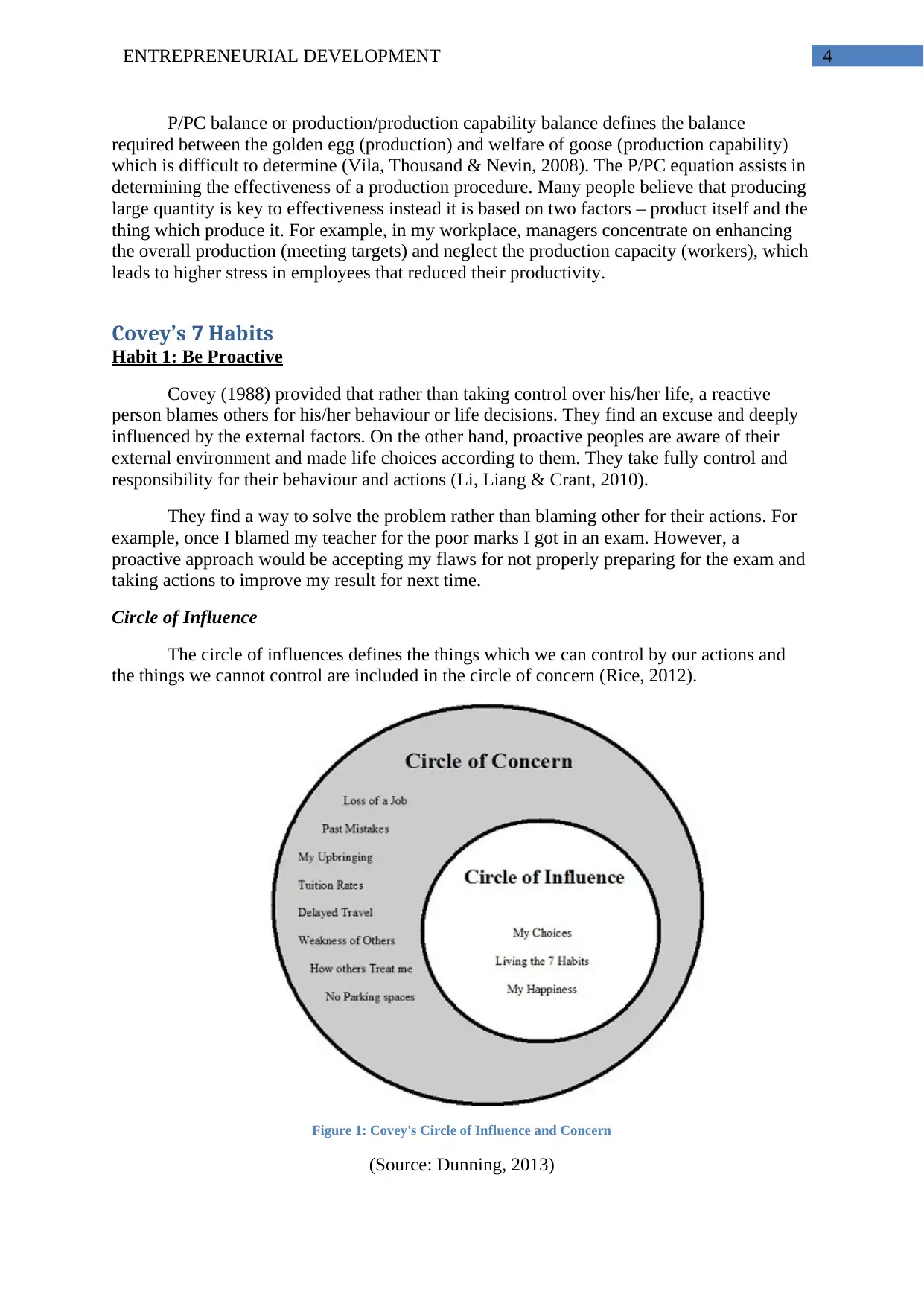
4ENTREPRENEURIAL DEVELOPMENT
P/PC balance or production/production capability balance defines the balance
required between the golden egg (production) and welfare of goose (production capability)
which is difficult to determine (Vila, Thousand & Nevin, 2008). The P/PC equation assists in
determining the effectiveness of a production procedure. Many people believe that producing
large quantity is key to effectiveness instead it is based on two factors – product itself and the
thing which produce it. For example, in my workplace, managers concentrate on enhancing
the overall production (meeting targets) and neglect the production capacity (workers), which
leads to higher stress in employees that reduced their productivity.
Covey’s 7 Habits
Habit 1: Be Proactive
Covey (1988) provided that rather than taking control over his/her life, a reactive
person blames others for his/her behaviour or life decisions. They find an excuse and deeply
influenced by the external factors. On the other hand, proactive peoples are aware of their
external environment and made life choices according to them. They take fully control and
responsibility for their behaviour and actions (Li, Liang & Crant, 2010).
They find a way to solve the problem rather than blaming other for their actions. For
example, once I blamed my teacher for the poor marks I got in an exam. However, a
proactive approach would be accepting my flaws for not properly preparing for the exam and
taking actions to improve my result for next time.
Circle of Influence
The circle of influences defines the things which we can control by our actions and
the things we cannot control are included in the circle of concern (Rice, 2012).
Figure 1: Covey's Circle of Influence and Concern
(Source: Dunning, 2013)
P/PC balance or production/production capability balance defines the balance
required between the golden egg (production) and welfare of goose (production capability)
which is difficult to determine (Vila, Thousand & Nevin, 2008). The P/PC equation assists in
determining the effectiveness of a production procedure. Many people believe that producing
large quantity is key to effectiveness instead it is based on two factors – product itself and the
thing which produce it. For example, in my workplace, managers concentrate on enhancing
the overall production (meeting targets) and neglect the production capacity (workers), which
leads to higher stress in employees that reduced their productivity.
Covey’s 7 Habits
Habit 1: Be Proactive
Covey (1988) provided that rather than taking control over his/her life, a reactive
person blames others for his/her behaviour or life decisions. They find an excuse and deeply
influenced by the external factors. On the other hand, proactive peoples are aware of their
external environment and made life choices according to them. They take fully control and
responsibility for their behaviour and actions (Li, Liang & Crant, 2010).
They find a way to solve the problem rather than blaming other for their actions. For
example, once I blamed my teacher for the poor marks I got in an exam. However, a
proactive approach would be accepting my flaws for not properly preparing for the exam and
taking actions to improve my result for next time.
Circle of Influence
The circle of influences defines the things which we can control by our actions and
the things we cannot control are included in the circle of concern (Rice, 2012).
Figure 1: Covey's Circle of Influence and Concern
(Source: Dunning, 2013)
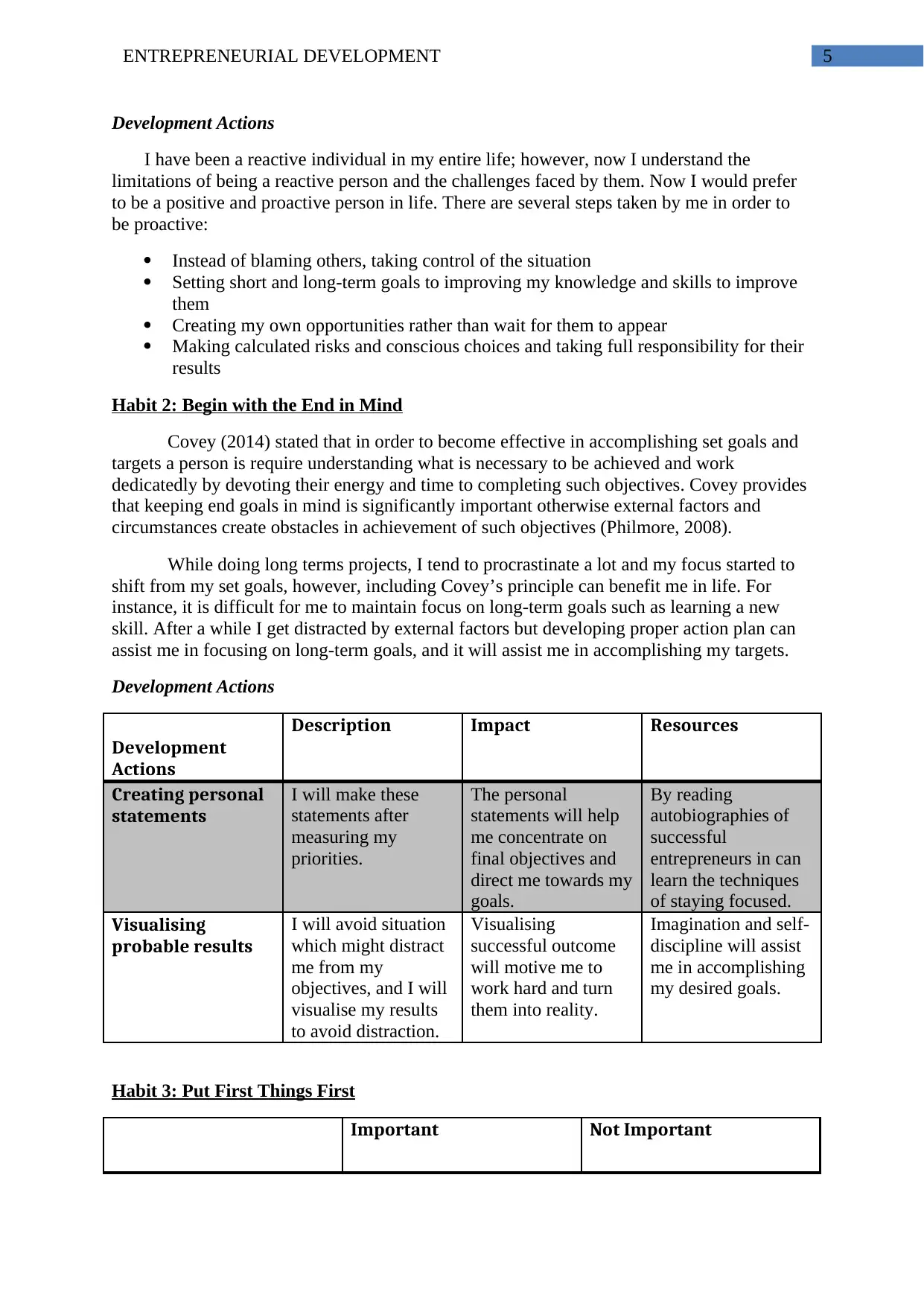
5ENTREPRENEURIAL DEVELOPMENT
Development Actions
I have been a reactive individual in my entire life; however, now I understand the
limitations of being a reactive person and the challenges faced by them. Now I would prefer
to be a positive and proactive person in life. There are several steps taken by me in order to
be proactive:
Instead of blaming others, taking control of the situation
Setting short and long-term goals to improving my knowledge and skills to improve
them
Creating my own opportunities rather than wait for them to appear
Making calculated risks and conscious choices and taking full responsibility for their
results
Habit 2: Begin with the End in Mind
Covey (2014) stated that in order to become effective in accomplishing set goals and
targets a person is require understanding what is necessary to be achieved and work
dedicatedly by devoting their energy and time to completing such objectives. Covey provides
that keeping end goals in mind is significantly important otherwise external factors and
circumstances create obstacles in achievement of such objectives (Philmore, 2008).
While doing long terms projects, I tend to procrastinate a lot and my focus started to
shift from my set goals, however, including Covey’s principle can benefit me in life. For
instance, it is difficult for me to maintain focus on long-term goals such as learning a new
skill. After a while I get distracted by external factors but developing proper action plan can
assist me in focusing on long-term goals, and it will assist me in accomplishing my targets.
Development Actions
Development
Actions
Description Impact Resources
Creating personal
statements
I will make these
statements after
measuring my
priorities.
The personal
statements will help
me concentrate on
final objectives and
direct me towards my
goals.
By reading
autobiographies of
successful
entrepreneurs in can
learn the techniques
of staying focused.
Visualising
probable results
I will avoid situation
which might distract
me from my
objectives, and I will
visualise my results
to avoid distraction.
Visualising
successful outcome
will motive me to
work hard and turn
them into reality.
Imagination and self-
discipline will assist
me in accomplishing
my desired goals.
Habit 3: Put First Things First
Important Not Important
Development Actions
I have been a reactive individual in my entire life; however, now I understand the
limitations of being a reactive person and the challenges faced by them. Now I would prefer
to be a positive and proactive person in life. There are several steps taken by me in order to
be proactive:
Instead of blaming others, taking control of the situation
Setting short and long-term goals to improving my knowledge and skills to improve
them
Creating my own opportunities rather than wait for them to appear
Making calculated risks and conscious choices and taking full responsibility for their
results
Habit 2: Begin with the End in Mind
Covey (2014) stated that in order to become effective in accomplishing set goals and
targets a person is require understanding what is necessary to be achieved and work
dedicatedly by devoting their energy and time to completing such objectives. Covey provides
that keeping end goals in mind is significantly important otherwise external factors and
circumstances create obstacles in achievement of such objectives (Philmore, 2008).
While doing long terms projects, I tend to procrastinate a lot and my focus started to
shift from my set goals, however, including Covey’s principle can benefit me in life. For
instance, it is difficult for me to maintain focus on long-term goals such as learning a new
skill. After a while I get distracted by external factors but developing proper action plan can
assist me in focusing on long-term goals, and it will assist me in accomplishing my targets.
Development Actions
Development
Actions
Description Impact Resources
Creating personal
statements
I will make these
statements after
measuring my
priorities.
The personal
statements will help
me concentrate on
final objectives and
direct me towards my
goals.
By reading
autobiographies of
successful
entrepreneurs in can
learn the techniques
of staying focused.
Visualising
probable results
I will avoid situation
which might distract
me from my
objectives, and I will
visualise my results
to avoid distraction.
Visualising
successful outcome
will motive me to
work hard and turn
them into reality.
Imagination and self-
discipline will assist
me in accomplishing
my desired goals.
Habit 3: Put First Things First
Important Not Important
⊘ This is a preview!⊘
Do you want full access?
Subscribe today to unlock all pages.

Trusted by 1+ million students worldwide
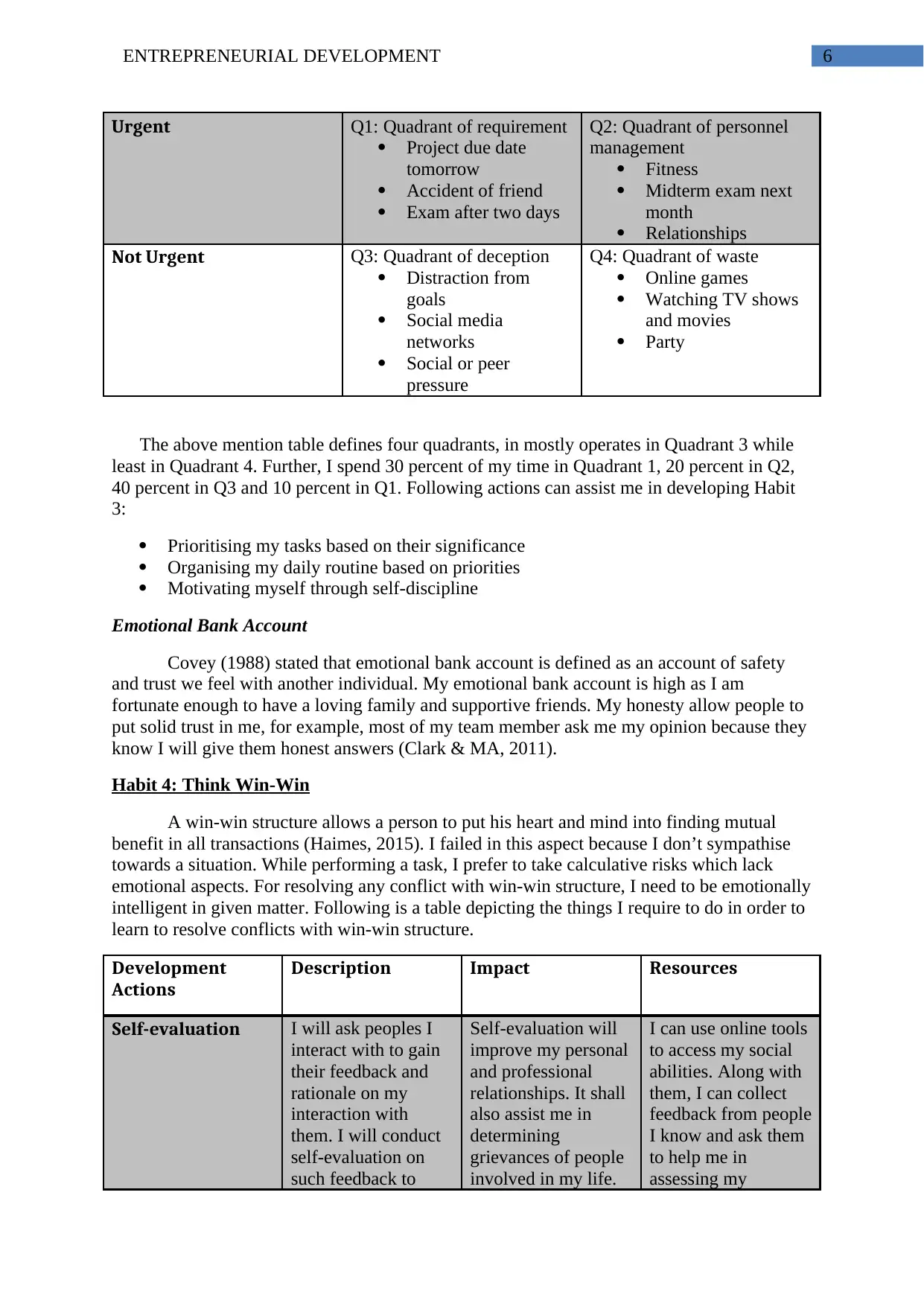
6ENTREPRENEURIAL DEVELOPMENT
Urgent Q1: Quadrant of requirement
Project due date
tomorrow
Accident of friend
Exam after two days
Q2: Quadrant of personnel
management
Fitness
Midterm exam next
month
Relationships
Not Urgent Q3: Quadrant of deception
Distraction from
goals
Social media
networks
Social or peer
pressure
Q4: Quadrant of waste
Online games
Watching TV shows
and movies
Party
The above mention table defines four quadrants, in mostly operates in Quadrant 3 while
least in Quadrant 4. Further, I spend 30 percent of my time in Quadrant 1, 20 percent in Q2,
40 percent in Q3 and 10 percent in Q1. Following actions can assist me in developing Habit
3:
Prioritising my tasks based on their significance
Organising my daily routine based on priorities
Motivating myself through self-discipline
Emotional Bank Account
Covey (1988) stated that emotional bank account is defined as an account of safety
and trust we feel with another individual. My emotional bank account is high as I am
fortunate enough to have a loving family and supportive friends. My honesty allow people to
put solid trust in me, for example, most of my team member ask me my opinion because they
know I will give them honest answers (Clark & MA, 2011).
Habit 4: Think Win-Win
A win-win structure allows a person to put his heart and mind into finding mutual
benefit in all transactions (Haimes, 2015). I failed in this aspect because I don’t sympathise
towards a situation. While performing a task, I prefer to take calculative risks which lack
emotional aspects. For resolving any conflict with win-win structure, I need to be emotionally
intelligent in given matter. Following is a table depicting the things I require to do in order to
learn to resolve conflicts with win-win structure.
Development
Actions
Description Impact Resources
Self-evaluation I will ask peoples I
interact with to gain
their feedback and
rationale on my
interaction with
them. I will conduct
self-evaluation on
such feedback to
Self-evaluation will
improve my personal
and professional
relationships. It shall
also assist me in
determining
grievances of people
involved in my life.
I can use online tools
to access my social
abilities. Along with
them, I can collect
feedback from people
I know and ask them
to help me in
assessing my
Urgent Q1: Quadrant of requirement
Project due date
tomorrow
Accident of friend
Exam after two days
Q2: Quadrant of personnel
management
Fitness
Midterm exam next
month
Relationships
Not Urgent Q3: Quadrant of deception
Distraction from
goals
Social media
networks
Social or peer
pressure
Q4: Quadrant of waste
Online games
Watching TV shows
and movies
Party
The above mention table defines four quadrants, in mostly operates in Quadrant 3 while
least in Quadrant 4. Further, I spend 30 percent of my time in Quadrant 1, 20 percent in Q2,
40 percent in Q3 and 10 percent in Q1. Following actions can assist me in developing Habit
3:
Prioritising my tasks based on their significance
Organising my daily routine based on priorities
Motivating myself through self-discipline
Emotional Bank Account
Covey (1988) stated that emotional bank account is defined as an account of safety
and trust we feel with another individual. My emotional bank account is high as I am
fortunate enough to have a loving family and supportive friends. My honesty allow people to
put solid trust in me, for example, most of my team member ask me my opinion because they
know I will give them honest answers (Clark & MA, 2011).
Habit 4: Think Win-Win
A win-win structure allows a person to put his heart and mind into finding mutual
benefit in all transactions (Haimes, 2015). I failed in this aspect because I don’t sympathise
towards a situation. While performing a task, I prefer to take calculative risks which lack
emotional aspects. For resolving any conflict with win-win structure, I need to be emotionally
intelligent in given matter. Following is a table depicting the things I require to do in order to
learn to resolve conflicts with win-win structure.
Development
Actions
Description Impact Resources
Self-evaluation I will ask peoples I
interact with to gain
their feedback and
rationale on my
interaction with
them. I will conduct
self-evaluation on
such feedback to
Self-evaluation will
improve my personal
and professional
relationships. It shall
also assist me in
determining
grievances of people
involved in my life.
I can use online tools
to access my social
abilities. Along with
them, I can collect
feedback from people
I know and ask them
to help me in
assessing my
Paraphrase This Document
Need a fresh take? Get an instant paraphrase of this document with our AI Paraphraser
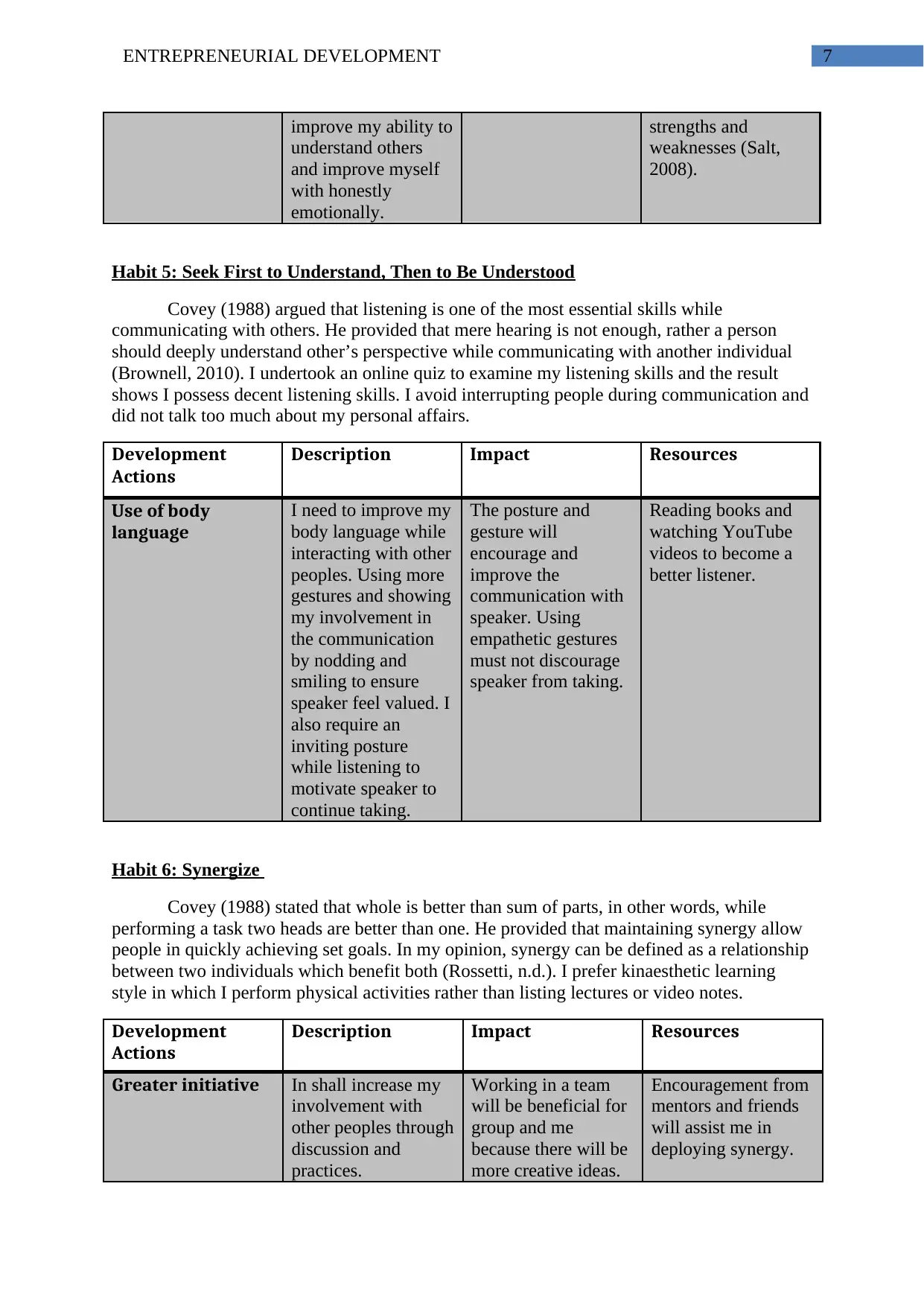
7ENTREPRENEURIAL DEVELOPMENT
improve my ability to
understand others
and improve myself
with honestly
emotionally.
strengths and
weaknesses (Salt,
2008).
Habit 5: Seek First to Understand, Then to Be Understood
Covey (1988) argued that listening is one of the most essential skills while
communicating with others. He provided that mere hearing is not enough, rather a person
should deeply understand other’s perspective while communicating with another individual
(Brownell, 2010). I undertook an online quiz to examine my listening skills and the result
shows I possess decent listening skills. I avoid interrupting people during communication and
did not talk too much about my personal affairs.
Development
Actions
Description Impact Resources
Use of body
language
I need to improve my
body language while
interacting with other
peoples. Using more
gestures and showing
my involvement in
the communication
by nodding and
smiling to ensure
speaker feel valued. I
also require an
inviting posture
while listening to
motivate speaker to
continue taking.
The posture and
gesture will
encourage and
improve the
communication with
speaker. Using
empathetic gestures
must not discourage
speaker from taking.
Reading books and
watching YouTube
videos to become a
better listener.
Habit 6: Synergize
Covey (1988) stated that whole is better than sum of parts, in other words, while
performing a task two heads are better than one. He provided that maintaining synergy allow
people in quickly achieving set goals. In my opinion, synergy can be defined as a relationship
between two individuals which benefit both (Rossetti, n.d.). I prefer kinaesthetic learning
style in which I perform physical activities rather than listing lectures or video notes.
Development
Actions
Description Impact Resources
Greater initiative In shall increase my
involvement with
other peoples through
discussion and
practices.
Working in a team
will be beneficial for
group and me
because there will be
more creative ideas.
Encouragement from
mentors and friends
will assist me in
deploying synergy.
improve my ability to
understand others
and improve myself
with honestly
emotionally.
strengths and
weaknesses (Salt,
2008).
Habit 5: Seek First to Understand, Then to Be Understood
Covey (1988) argued that listening is one of the most essential skills while
communicating with others. He provided that mere hearing is not enough, rather a person
should deeply understand other’s perspective while communicating with another individual
(Brownell, 2010). I undertook an online quiz to examine my listening skills and the result
shows I possess decent listening skills. I avoid interrupting people during communication and
did not talk too much about my personal affairs.
Development
Actions
Description Impact Resources
Use of body
language
I need to improve my
body language while
interacting with other
peoples. Using more
gestures and showing
my involvement in
the communication
by nodding and
smiling to ensure
speaker feel valued. I
also require an
inviting posture
while listening to
motivate speaker to
continue taking.
The posture and
gesture will
encourage and
improve the
communication with
speaker. Using
empathetic gestures
must not discourage
speaker from taking.
Reading books and
watching YouTube
videos to become a
better listener.
Habit 6: Synergize
Covey (1988) stated that whole is better than sum of parts, in other words, while
performing a task two heads are better than one. He provided that maintaining synergy allow
people in quickly achieving set goals. In my opinion, synergy can be defined as a relationship
between two individuals which benefit both (Rossetti, n.d.). I prefer kinaesthetic learning
style in which I perform physical activities rather than listing lectures or video notes.
Development
Actions
Description Impact Resources
Greater initiative In shall increase my
involvement with
other peoples through
discussion and
practices.
Working in a team
will be beneficial for
group and me
because there will be
more creative ideas.
Encouragement from
mentors and friends
will assist me in
deploying synergy.
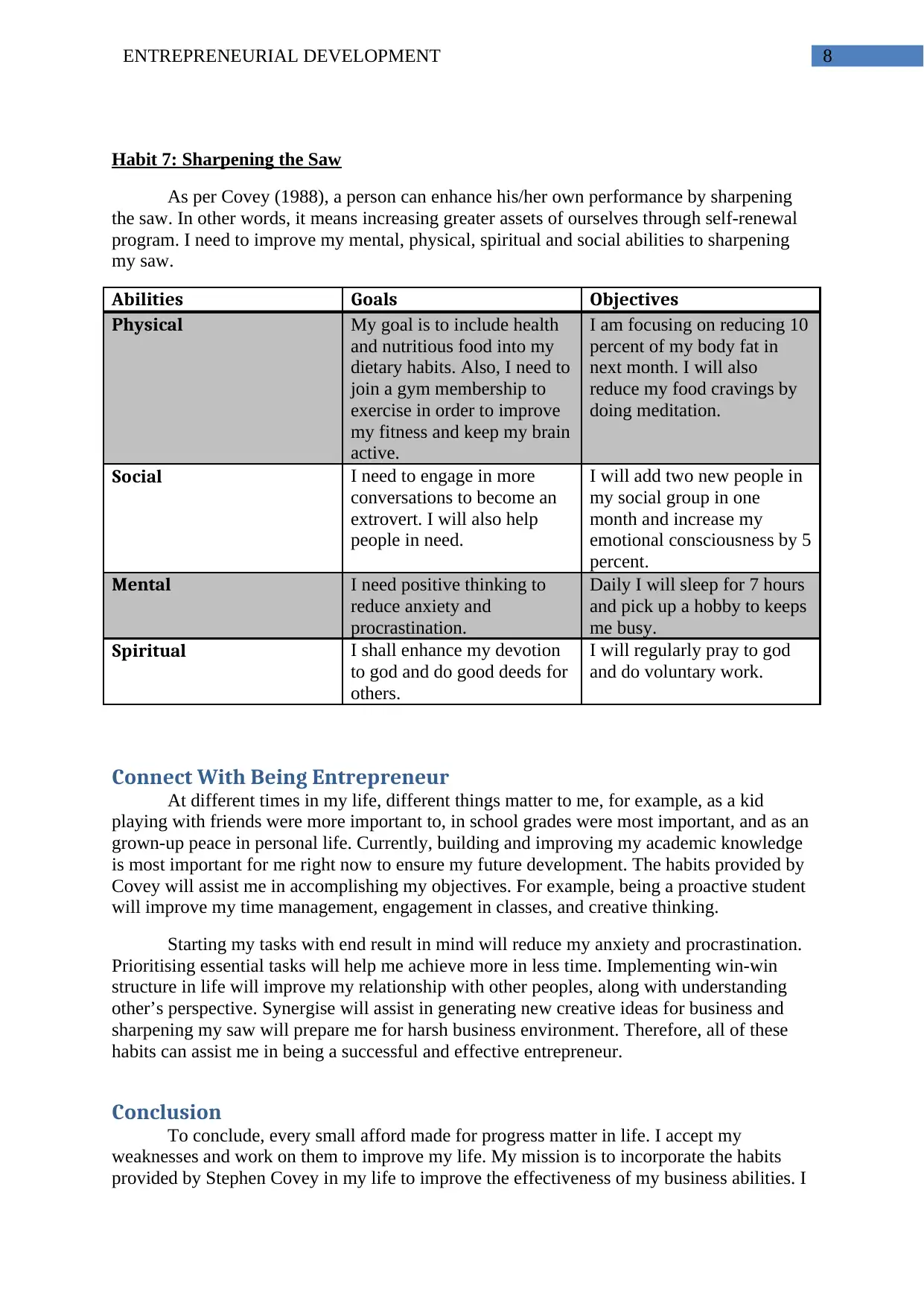
8ENTREPRENEURIAL DEVELOPMENT
Habit 7: Sharpening the Saw
As per Covey (1988), a person can enhance his/her own performance by sharpening
the saw. In other words, it means increasing greater assets of ourselves through self-renewal
program. I need to improve my mental, physical, spiritual and social abilities to sharpening
my saw.
Abilities Goals Objectives
Physical My goal is to include health
and nutritious food into my
dietary habits. Also, I need to
join a gym membership to
exercise in order to improve
my fitness and keep my brain
active.
I am focusing on reducing 10
percent of my body fat in
next month. I will also
reduce my food cravings by
doing meditation.
Social I need to engage in more
conversations to become an
extrovert. I will also help
people in need.
I will add two new people in
my social group in one
month and increase my
emotional consciousness by 5
percent.
Mental I need positive thinking to
reduce anxiety and
procrastination.
Daily I will sleep for 7 hours
and pick up a hobby to keeps
me busy.
Spiritual I shall enhance my devotion
to god and do good deeds for
others.
I will regularly pray to god
and do voluntary work.
Connect With Being Entrepreneur
At different times in my life, different things matter to me, for example, as a kid
playing with friends were more important to, in school grades were most important, and as an
grown-up peace in personal life. Currently, building and improving my academic knowledge
is most important for me right now to ensure my future development. The habits provided by
Covey will assist me in accomplishing my objectives. For example, being a proactive student
will improve my time management, engagement in classes, and creative thinking.
Starting my tasks with end result in mind will reduce my anxiety and procrastination.
Prioritising essential tasks will help me achieve more in less time. Implementing win-win
structure in life will improve my relationship with other peoples, along with understanding
other’s perspective. Synergise will assist in generating new creative ideas for business and
sharpening my saw will prepare me for harsh business environment. Therefore, all of these
habits can assist me in being a successful and effective entrepreneur.
Conclusion
To conclude, every small afford made for progress matter in life. I accept my
weaknesses and work on them to improve my life. My mission is to incorporate the habits
provided by Stephen Covey in my life to improve the effectiveness of my business abilities. I
Habit 7: Sharpening the Saw
As per Covey (1988), a person can enhance his/her own performance by sharpening
the saw. In other words, it means increasing greater assets of ourselves through self-renewal
program. I need to improve my mental, physical, spiritual and social abilities to sharpening
my saw.
Abilities Goals Objectives
Physical My goal is to include health
and nutritious food into my
dietary habits. Also, I need to
join a gym membership to
exercise in order to improve
my fitness and keep my brain
active.
I am focusing on reducing 10
percent of my body fat in
next month. I will also
reduce my food cravings by
doing meditation.
Social I need to engage in more
conversations to become an
extrovert. I will also help
people in need.
I will add two new people in
my social group in one
month and increase my
emotional consciousness by 5
percent.
Mental I need positive thinking to
reduce anxiety and
procrastination.
Daily I will sleep for 7 hours
and pick up a hobby to keeps
me busy.
Spiritual I shall enhance my devotion
to god and do good deeds for
others.
I will regularly pray to god
and do voluntary work.
Connect With Being Entrepreneur
At different times in my life, different things matter to me, for example, as a kid
playing with friends were more important to, in school grades were most important, and as an
grown-up peace in personal life. Currently, building and improving my academic knowledge
is most important for me right now to ensure my future development. The habits provided by
Covey will assist me in accomplishing my objectives. For example, being a proactive student
will improve my time management, engagement in classes, and creative thinking.
Starting my tasks with end result in mind will reduce my anxiety and procrastination.
Prioritising essential tasks will help me achieve more in less time. Implementing win-win
structure in life will improve my relationship with other peoples, along with understanding
other’s perspective. Synergise will assist in generating new creative ideas for business and
sharpening my saw will prepare me for harsh business environment. Therefore, all of these
habits can assist me in being a successful and effective entrepreneur.
Conclusion
To conclude, every small afford made for progress matter in life. I accept my
weaknesses and work on them to improve my life. My mission is to incorporate the habits
provided by Stephen Covey in my life to improve the effectiveness of my business abilities. I
⊘ This is a preview!⊘
Do you want full access?
Subscribe today to unlock all pages.

Trusted by 1+ million students worldwide
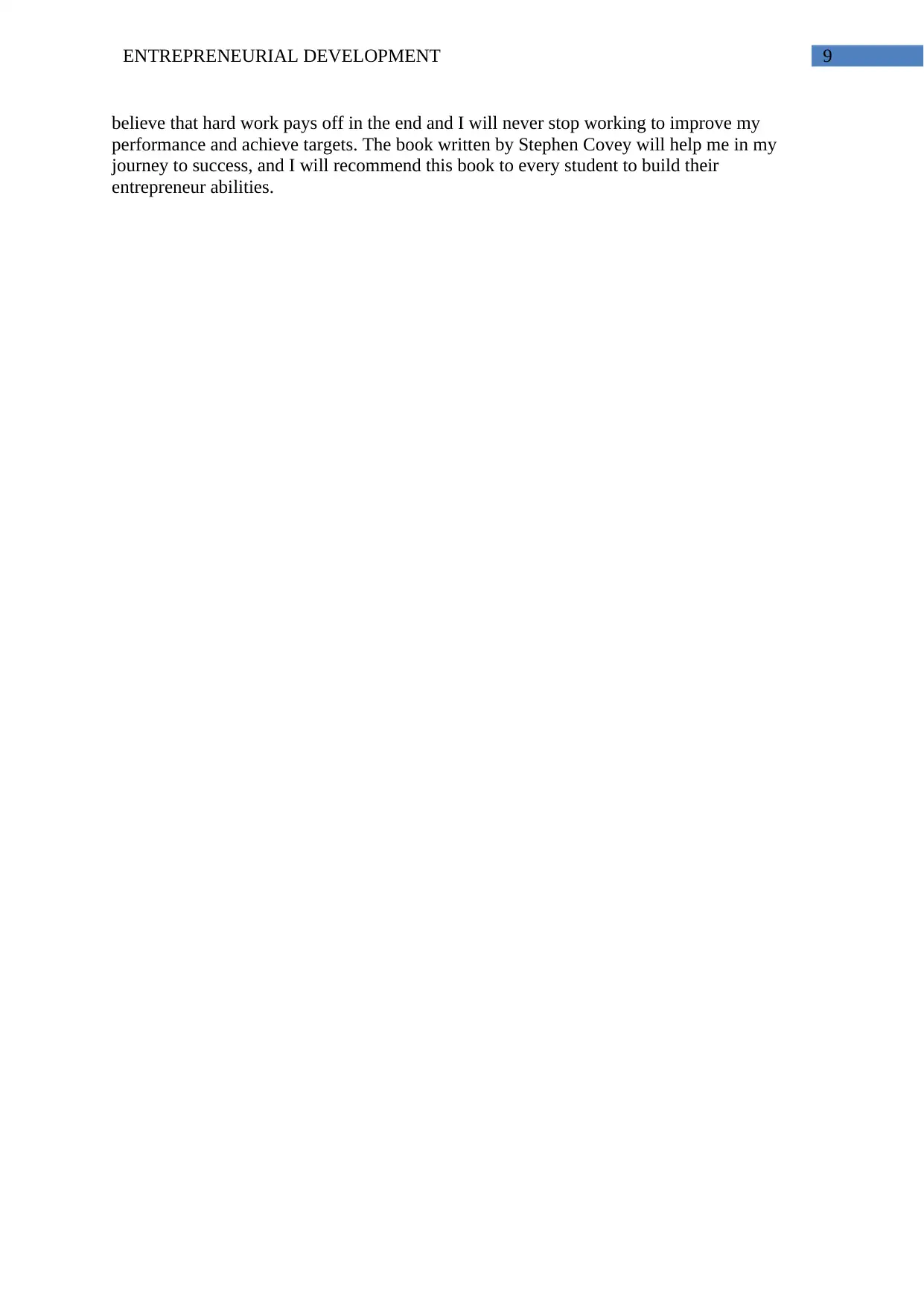
9ENTREPRENEURIAL DEVELOPMENT
believe that hard work pays off in the end and I will never stop working to improve my
performance and achieve targets. The book written by Stephen Covey will help me in my
journey to success, and I will recommend this book to every student to build their
entrepreneur abilities.
believe that hard work pays off in the end and I will never stop working to improve my
performance and achieve targets. The book written by Stephen Covey will help me in my
journey to success, and I will recommend this book to every student to build their
entrepreneur abilities.
Paraphrase This Document
Need a fresh take? Get an instant paraphrase of this document with our AI Paraphraser
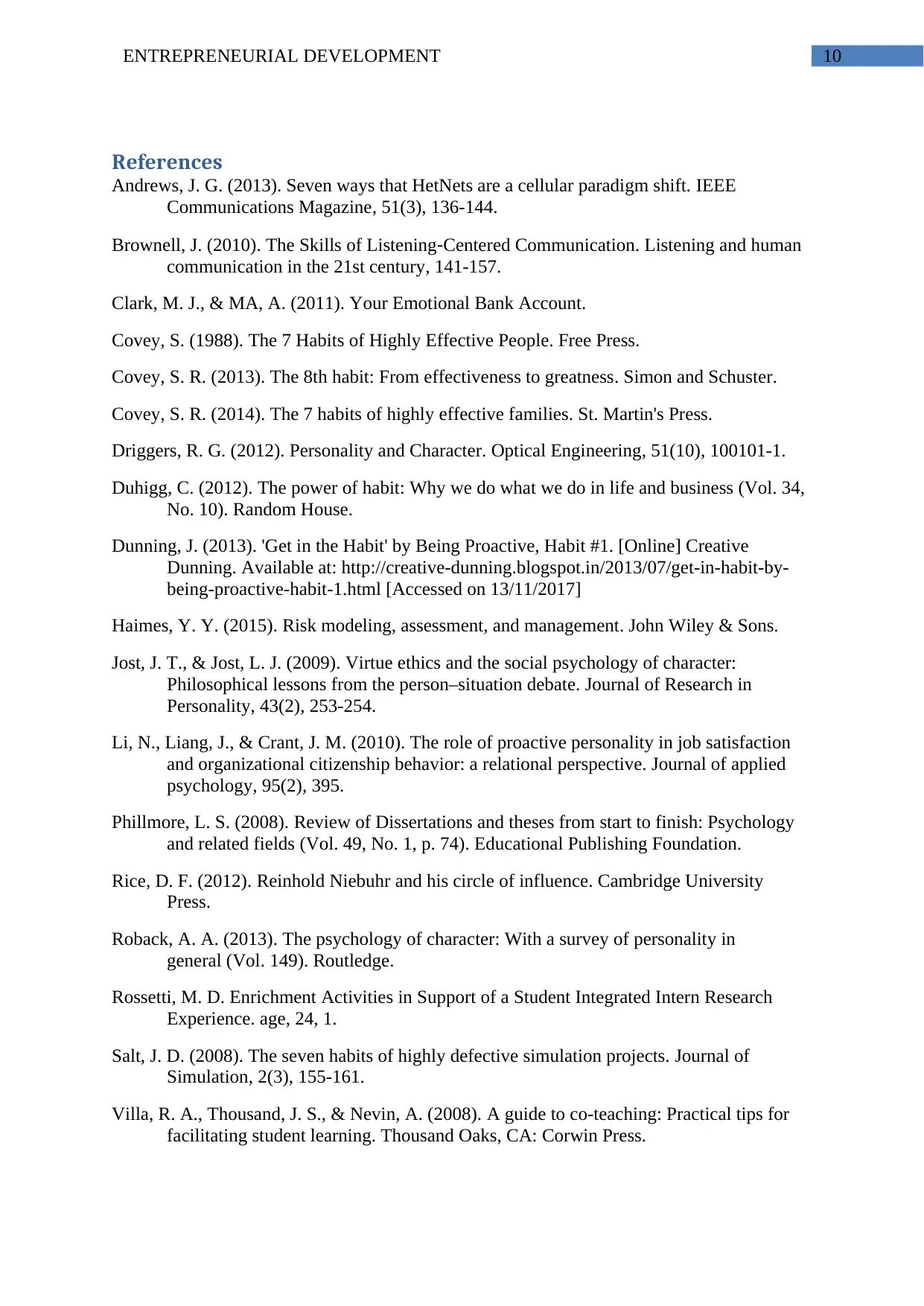
10ENTREPRENEURIAL DEVELOPMENT
References
Andrews, J. G. (2013). Seven ways that HetNets are a cellular paradigm shift. IEEE
Communications Magazine, 51(3), 136-144.
Brownell, J. (2010). The Skills of Listening‐Centered Communication. Listening and human
communication in the 21st century, 141-157.
Clark, M. J., & MA, A. (2011). Your Emotional Bank Account.
Covey, S. (1988). The 7 Habits of Highly Effective People. Free Press.
Covey, S. R. (2013). The 8th habit: From effectiveness to greatness. Simon and Schuster.
Covey, S. R. (2014). The 7 habits of highly effective families. St. Martin's Press.
Driggers, R. G. (2012). Personality and Character. Optical Engineering, 51(10), 100101-1.
Duhigg, C. (2012). The power of habit: Why we do what we do in life and business (Vol. 34,
No. 10). Random House.
Dunning, J. (2013). 'Get in the Habit' by Being Proactive, Habit #1. [Online] Creative
Dunning. Available at: http://creative-dunning.blogspot.in/2013/07/get-in-habit-by-
being-proactive-habit-1.html [Accessed on 13/11/2017]
Haimes, Y. Y. (2015). Risk modeling, assessment, and management. John Wiley & Sons.
Jost, J. T., & Jost, L. J. (2009). Virtue ethics and the social psychology of character:
Philosophical lessons from the person–situation debate. Journal of Research in
Personality, 43(2), 253-254.
Li, N., Liang, J., & Crant, J. M. (2010). The role of proactive personality in job satisfaction
and organizational citizenship behavior: a relational perspective. Journal of applied
psychology, 95(2), 395.
Phillmore, L. S. (2008). Review of Dissertations and theses from start to finish: Psychology
and related fields (Vol. 49, No. 1, p. 74). Educational Publishing Foundation.
Rice, D. F. (2012). Reinhold Niebuhr and his circle of influence. Cambridge University
Press.
Roback, A. A. (2013). The psychology of character: With a survey of personality in
general (Vol. 149). Routledge.
Rossetti, M. D. Enrichment Activities in Support of a Student Integrated Intern Research
Experience. age, 24, 1.
Salt, J. D. (2008). The seven habits of highly defective simulation projects. Journal of
Simulation, 2(3), 155-161.
Villa, R. A., Thousand, J. S., & Nevin, A. (2008). A guide to co-teaching: Practical tips for
facilitating student learning. Thousand Oaks, CA: Corwin Press.
References
Andrews, J. G. (2013). Seven ways that HetNets are a cellular paradigm shift. IEEE
Communications Magazine, 51(3), 136-144.
Brownell, J. (2010). The Skills of Listening‐Centered Communication. Listening and human
communication in the 21st century, 141-157.
Clark, M. J., & MA, A. (2011). Your Emotional Bank Account.
Covey, S. (1988). The 7 Habits of Highly Effective People. Free Press.
Covey, S. R. (2013). The 8th habit: From effectiveness to greatness. Simon and Schuster.
Covey, S. R. (2014). The 7 habits of highly effective families. St. Martin's Press.
Driggers, R. G. (2012). Personality and Character. Optical Engineering, 51(10), 100101-1.
Duhigg, C. (2012). The power of habit: Why we do what we do in life and business (Vol. 34,
No. 10). Random House.
Dunning, J. (2013). 'Get in the Habit' by Being Proactive, Habit #1. [Online] Creative
Dunning. Available at: http://creative-dunning.blogspot.in/2013/07/get-in-habit-by-
being-proactive-habit-1.html [Accessed on 13/11/2017]
Haimes, Y. Y. (2015). Risk modeling, assessment, and management. John Wiley & Sons.
Jost, J. T., & Jost, L. J. (2009). Virtue ethics and the social psychology of character:
Philosophical lessons from the person–situation debate. Journal of Research in
Personality, 43(2), 253-254.
Li, N., Liang, J., & Crant, J. M. (2010). The role of proactive personality in job satisfaction
and organizational citizenship behavior: a relational perspective. Journal of applied
psychology, 95(2), 395.
Phillmore, L. S. (2008). Review of Dissertations and theses from start to finish: Psychology
and related fields (Vol. 49, No. 1, p. 74). Educational Publishing Foundation.
Rice, D. F. (2012). Reinhold Niebuhr and his circle of influence. Cambridge University
Press.
Roback, A. A. (2013). The psychology of character: With a survey of personality in
general (Vol. 149). Routledge.
Rossetti, M. D. Enrichment Activities in Support of a Student Integrated Intern Research
Experience. age, 24, 1.
Salt, J. D. (2008). The seven habits of highly defective simulation projects. Journal of
Simulation, 2(3), 155-161.
Villa, R. A., Thousand, J. S., & Nevin, A. (2008). A guide to co-teaching: Practical tips for
facilitating student learning. Thousand Oaks, CA: Corwin Press.
1 out of 11
Your All-in-One AI-Powered Toolkit for Academic Success.
+13062052269
info@desklib.com
Available 24*7 on WhatsApp / Email
![[object Object]](/_next/static/media/star-bottom.7253800d.svg)
Unlock your academic potential
Copyright © 2020–2026 A2Z Services. All Rights Reserved. Developed and managed by ZUCOL.

